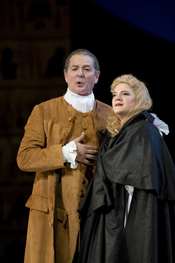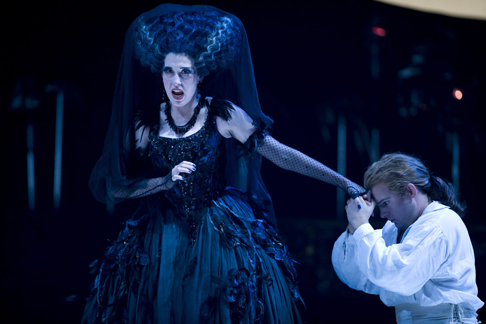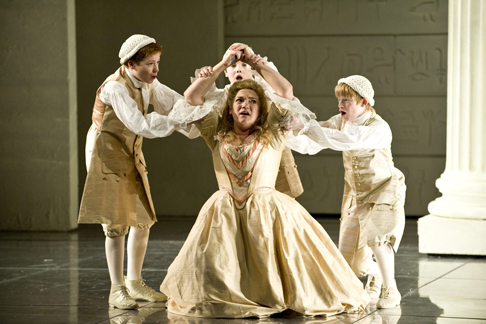Recently in Reviews
English Touring Opera are delighted to announce a season of lyric monodramas to tour nationally from October to December. The season features music for solo singer and piano by Argento, Britten, Tippett and Shostakovich with a bold and inventive approach to making opera during social distancing.
This tenth of ten Live from London concerts was in fact a recorded live performance from California. It was no less enjoyable for that, and it was also uplifting to learn that this wasn’t in fact the ‘last’ LfL event that we will be able to enjoy, courtesy of VOCES8 and their fellow vocal ensembles (more below …).
Ever since Wigmore Hall announced their superb series of autumn concerts, all streamed live and available free of charge, I’d been looking forward to this song recital by Ian Bostridge and Imogen Cooper.
The Sixteen continues its exploration of Henry Purcell’s Welcome Songs for Charles II. As with Robert King’s pioneering Purcell series begun over thirty years ago for Hyperion, Harry Christophers is recording two Welcome Songs per disc.
Although Stile Antico’s programme article for their Live from London recital introduced their selection from the many treasures of the English Renaissance in the context of the theological debates and upheavals of the Tudor and Elizabethan years, their performance was more evocative of private chamber music than of public liturgy.
In February this year, Albanian soprano Ermonela Jaho made a highly lauded debut recital at Wigmore Hall - a concert which both celebrated Opera Rara’s 50th anniversary and honoured the career of the Italian soprano Rosina Storchio (1872-1945), the star of verismo who created the title roles in Leoncavallo’s La bohème and Zazà, Mascagni’s Lodoletta and Puccini’s Madama Butterfly.
Evidently, face masks don’t stifle appreciative “Bravo!”s. And, reducing audience numbers doesn’t lower the volume of such acclamations. For, the audience at Wigmore Hall gave soprano Elizabeth Llewellyn and pianist Simon Lepper a greatly deserved warm reception and hearty response following this lunchtime recital of late-Romantic song.
Collapsology. Or, perhaps we should use the French word ‘Collapsologie’ because this is a transdisciplinary idea pretty much advocated by a series of French theorists - and apparently, mostly French theorists. It in essence focuses on the imminent collapse of modern society and all its layers - a series of escalating crises on a global scale: environmental, economic, geopolitical, governmental; the list is extensive.
For this week’s Live from London vocal recital we moved from the home of VOCES8, St Anne and St Agnes in the City of London, to Kings Place, where The Sixteen - who have been associate artists at the venue for some time - presented a programme of music and words bound together by the theme of ‘reflection’.
'Such is your divine Disposation that both you excellently understand, and royally entertaine the Exercise of Musicke.’
Amongst an avalanche of new Mahler recordings appearing at the moment (Das Lied von der Erde seems to be the most favoured, with three) this 1991 Mahler Second from the 2nd Kassel MahlerFest is one of the more interesting releases.
‘And there was war in heaven: Michael and his angels fought against the dragon; and the dragon fought and his angels, And prevailed not; neither was their place found any more in heaven … that old serpent … Satan, which deceiveth the whole world: he was cast out into the earth, and his angels were cast out with him.’
If there is one myth, it seems believed by some people today, that probably needs shattering it is that post-war recordings or performances of Wagner operas were always of exceptional quality. This 1949 Hamburg Tristan und Isolde is one of those recordings - though quite who is to blame for its many problems takes quite some unearthing.
There was never any doubt that the fifth of the twelve Met Stars Live in Concert broadcasts was going to be a palpably intense and vivid event, as well as a musically stunning and theatrically enervating experience.
‘Love’ was the theme for this Live from London performance by Apollo5. Given the complexity and diversity of that human emotion, and Apollo5’s reputation for versatility and diverse repertoire, ranging from Renaissance choral music to jazz, from contemporary classical works to popular song, it was no surprise that their programme spanned 500 years and several musical styles.
The Academy of St Martin in the Fields have titled their autumn series of eight concerts - which are taking place at 5pm and 7.30pm on two Saturdays each month at their home venue in Trafalgar Square, and being filmed for streaming the following Thursday - ‘re:connect’.
The London Symphony Orchestra opened their Autumn 2020 season with a homage to Oliver Knussen, who died at the age of 66 in July 2018. The programme traced a national musical lineage through the twentieth century, from Britten to Knussen, on to Mark-Anthony Turnage, and entwining the LSO and Rattle too.
With the Live from London digital vocal festival entering the second half of the series, the festival’s host, VOCES8, returned to their home at St Annes and St Agnes in the City of London to present a sequence of ‘Choral Dances’ - vocal music inspired by dance, embracing diverse genres from the Renaissance madrigal to swing jazz.
Just a few unison string wriggles from the opening of Mozart’s overture to Le nozze di Figaro are enough to make any opera-lover perch on the edge of their seat, in excited anticipation of the drama in music to come, so there could be no other curtain-raiser for this Gala Concert at the Royal Opera House, the latest instalment from ‘their House’ to ‘our houses’.
"Before the ending of the day, creator of all things, we pray that, with your accustomed mercy, you may watch over us."
Reviews
![Robert Murray as Tamino [Photo by Richard H Smith courtesy of English National Opera]](http://www.operatoday.com/ENO_TheMagicFlute-07.png)
08 Feb 2009
Magic Flute at ENO
‘Back by popular demand’ claimed ENO’s publicity material for the
21-year-old production which had its supposed swan-song last season – though it remains questionable whether the company ever really intended to get rid of it.
Although Nicholas Hytner’s staging takes more of a ‘family
entertainment’ approach than some more psychologically searching productions,
with overt jokes and a pantomime-villain Monostatos, it is one of the
company’s greatest assets; a well-established rite of passage for many of
ENO’s promising young singers, an ideal first night at the opera for a child
or adult beginner, and the sort of show which it seemingly isn’t possible to
dislike.
 Robert Lloyd as Sarastro and Sarah-Jane Davies as Pamina
Robert Lloyd as Sarastro and Sarah-Jane Davies as Pamina
On this occasion, Sarah-Jane Davies and Robert Murray were well-cast and
well-partnered as Tamino and Pamina. Davies sang in the last revival here,
and she has become a really lovely Mozartian singer, her beautifully
controlled soprano subtly imbued with pathos and emotion. Murray’s elegant
tenor was ideal for the high-born, high-minded youth, and he was eloquent in
his delivery of the English words. It was a shame that both seemed nervous
and tentative in their characterisation.
As the Queen of the Night, Emily Hindrichs’s small, brittle and
cleanly-placed soprano was initially impressive, but in the Act 2 spoken
dialogue her rage had little sense of a noblewoman’s wounded pride, and she
came across merely as petulant and shrill. Her subsequent aria had some
lapses in accuracy. Robert Lloyd – a rare sight on this stage, having
spent so much of his distinguished career at the Royal Opera – brought
gravitas and a fatherly presence to Sarastro, with bottom notes of rich
velvet.
Jeremy Sams’s gently humorous colloquial dialogue was delivered in a wide
range of regional accents, some more real than others. In the case of the
Three Ladies (guest principal Kate Valentine and chorus-members Susanna
Tudor-Thomas and Deborah Davison) whose glamorous feather-trimmed
midnight-blue costumes demand a certain amount of upper-class bearing, the
use of various accents was a misjudgement; I wondered whether perhaps one of
the three had been unable to disguise a genuine accent, and the other two had
been obliged to affect accents of their own to compensate.
Papageno was played once again as a genial Yorkshireman by the very
likeable Roderick Williams, though through no fault of his own he had trouble
living up to his job description on this occasion. Two of the four real white
doves, whose behaviour when they appear on stage during the Bird-catcher’s
Song is usually impeccable, got uncharacteristically overexcited and decided
it might be fun to evade capture. It took an additional pair of hands and a
good two or three minutes to round them up, amid much audience mirth. The
joys of live theatre!
 Emily Hindrichs as The Queen of Night and Robert Murray as Tamino
Emily Hindrichs as The Queen of Night and Robert Murray as Tamino
If the birds were intent on demonstrating the wisdom of the oft-repeated
advice never to work with children or animals, trebles Charlie Manton, Louis
Watkins and Harry Manton were here for the defence. They were quite the
finest trio of boys I can recall hearing, perfectly in tune and impeccably
vocally matched.
Conductor Erik Nielsen (Kapellmeister of the Frankfurt Opera), in his
house debut, was rather stately and mannered in a heavily Baroque-inflected
overture, but from then on his reading had a poised and even pacing that
never dragged.
 Sarah-Jane Davies as Pamina with the Three Spirits (Charlie Manton, Louis Watkins & Harry Manton)
Sarah-Jane Davies as Pamina with the Three Spirits (Charlie Manton, Louis Watkins & Harry Manton)
The company has been strangely quiet on the subject of whether the staging
has now been officially retired, or whether it has been granted a more
permanent reprieve. But now that opera companies have a bigger challenge than
ever in competing for audience spending power, it would surely be a waste to
scrap such a sure-fire hit as this. It keeps those doves in work,
anyway...
Ruth Elleson © 2009
![Robert Murray as Tamino [Photo by Richard H Smith courtesy of English National Opera]](http://www.operatoday.com/ENO_TheMagicFlute-07.png)


